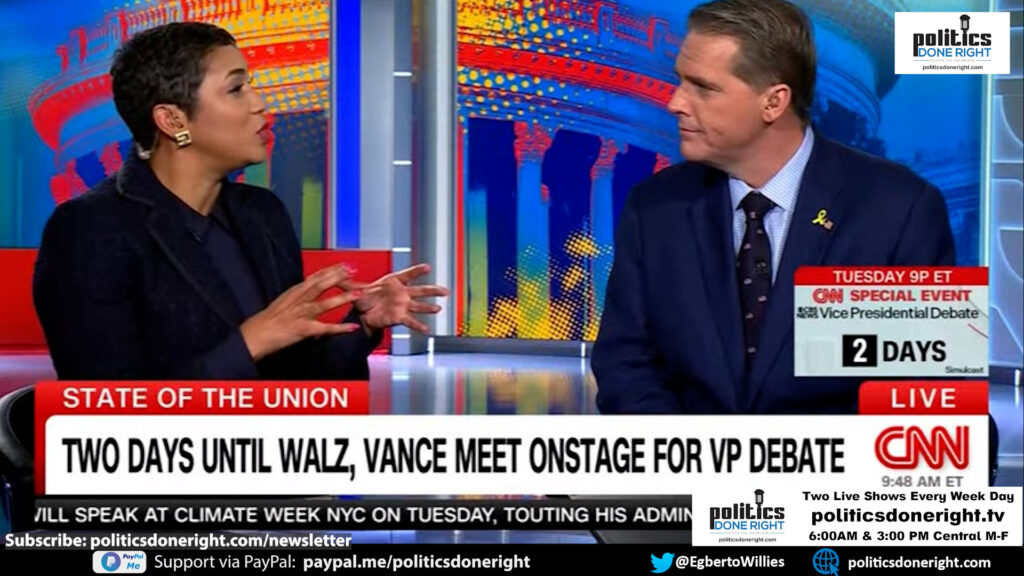Former Pelosi communication director Ashley Etienne lashed back at commentator and former Mitch McConnell Adviser after he maligned Tim Walz with Vance’s own words in defense of the failed JD Vance.
GOP commentator called out.
Watch Politics Done Right T.V. here.
Podcasts (Video — Audio)
The political dynamics in the United States are consistently shifting, and the significance of communication skills in public discourse has never been more important. A recent exchange between Ashley Etienne, former communications director for House Speaker Nancy Pelosi, and GOP commentator Scott Jennings on CNN highlights this. The discussion revolved around the role of vice-presidential picks in modern campaigns, with Etienne defending Minnesota Governor Tim Walz and sharply criticizing JD Vance, Donald Trump‘s running mate. Jennings, however, attempted to belittle Walz while defending Vance, only to find himself outmatched by Etienne’s poised and well-reasoned response.
The conversation began with Etienne noting how consequential vice-presidential picks have become in recent elections. She pointed out how JD Vance, once a vocal critic of Trump, had transformed into a loyal supporter. Vance’s critiques of Trump, where he infamously referred to him as “America’s Hitler” and lambasted his failed economic policies, stood in stark contrast to his current political position. This transformation was not lost on Etienne, who deftly used it to highlight the hypocrisy in Vance’s newfound loyalty to Trump. Instead of expanding Trump’s appeal, as Vance intended, Etienne suggested that Vance has done more harm than good to the Republican ticket.
Jennings, sensing the need to push back, pivoted to attacking Tim Walz, the Democratic vice-presidential pick, calling him a “buffoon” and claiming that he is kept away from the press because of his inadequacies. Jennings’s remarks came across as desperate, particularly when he mocked Walz’s background as a schoolteacher and derided his past press interactions. Jennings failed to recognize that his argument rested on hollow insults rather than substantive critique.
In contrast, Etienne’s response was calm, collected, and incisive. Rather than engaging in a tit-for-tat with Jennings, she stuck to the facts and demonstrated why Walz was, in fact, an effective pick for Kamala Harris’s campaign. Walz, a governor with a strong track record and appeal to moderate Republicans and independents, was chosen to bridge the cultural divides that have long plagued the Democratic Party’s outreach. His role is not just symbolic; it reflects the Democrats’ strategy to broaden their appeal in regions where Trump had once dominated.
Etienne’s handling of the situation was a masterclass in political communication. With a smile, she pointed out that Walz’s favorability ratings were significantly higher than Vance’s, undermining Jennings’s attempt to belittle Walz’s qualifications. This fact alone illustrates a broader truth: voters resonate more with authenticity and consistency than opportunism. Vance’s flip-flopping on Trump, from calling him a destructive force to defending him at every turn, exemplifies the political opportunism that turns voters off.
Furthermore, Etienne cleverly positioned Vance’s own words against him. By repeating Vance’s earlier critiques of Trump, she effectively framed him as someone who lacks principles and is willing to betray his beliefs for political gain. This is a dangerous image for any candidate, particularly one hoping to be seen as an asset to the top of the ticket. Etienne’s point was clear: if Vance could easily reverse his stance on Trump, how could voters trust him to stand by any other promise or principle?
This exchange also highlights a broader issue within the Republican Party, where loyalty to Trump has become the primary litmus test for candidates, even if it means compromising core values. Vance once celebrated for his critical take on Trump’s populist rhetoric and dangerous policies, has now become a symbol of that very capitulation. Etienne’s ability to expose this in real-time underscores the power of effective communication in revealing the contradictions that can exist within political alliances.
On the flip side, Etienne’s defense of Walz emphasized the Democrats’ approach to this election: a focus on bridging divides and appealing to a broader, more moderate electorate. While the GOP continues to rally around Trump’s base, often at the expense of alienating other constituencies, the Democratic Party is making a concerted effort to reach out to voters who may feel disillusioned with Trump but not entirely sold on progressive ideals.
Etienne’s performance during this debate is a reminder that sharp communication and a steady demeanor can dismantle even the most aggressive attacks. Jennings’s attempt to paint Walz as an incompetent buffoon backfired spectacularly, leaving him scrambling to defend a candidate who has undermined Trump more than helped him. The contrast between the two commentators was clear: one relied on insults and empty rhetoric, while the other used facts, consistency, and strategic insight.
In the larger context of American politics, this exchange is emblematic of the importance of vice-presidential candidates in today’s electoral landscape. As Etienne articulated, these picks are not mere afterthoughts but instrumental in shaping the public’s perception of the ticket. While Vance may have once been seen as a potential asset to Trump, his past criticisms and current obsequiousness have made him a liability. Conversely, with his strong favorability ratings and broad appeal, Walz represents a smart strategic choice for Harris, one that could help the Democrats in key battlegrounds.
Ashley Etienne’s performance on CNN was a brilliant example of how to handle baseless political attacks. By staying composed and relying on facts, she embarrassed Scott Jennings and highlighted the weaknesses in the Republican ticket, especially regarding JD Vance’s inconsistency and lack of principles.

